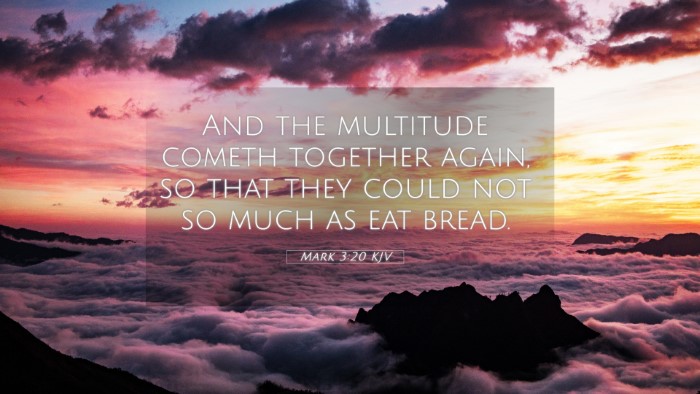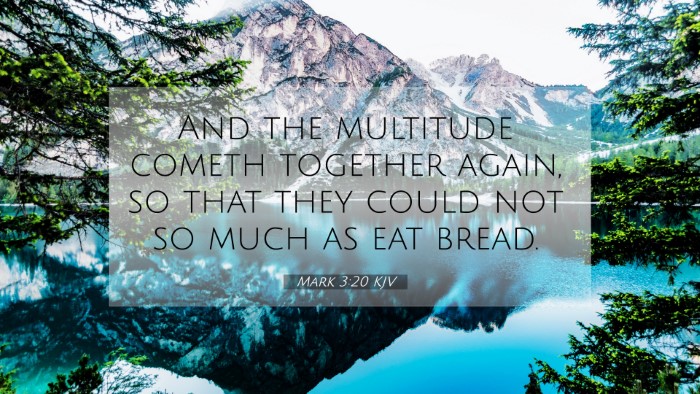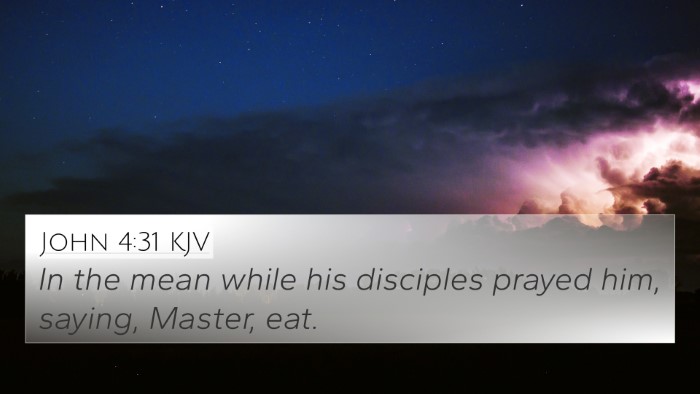Understanding Mark 3:20
Verse Reference: Mark 3:20 - "And the multitude cometh together again, so that they could not so much as eat bread."
Summary of Mark 3:20
This verse occurs during a critical period in Jesus’ ministry. It highlights the overwhelming response from the people who flocked to hear Him preach and witness His miracles. The mention that they could not even eat bread signifies that the demands of ministry can overshadow even the most basic human needs.
Commentary Insights
- Matthew Henry: He notes that the throngs of people created a scenario where Jesus and His disciples were so occupied with ministry that they neglected to eat. This reflects the urgency and the nature of Christ's mission.
- Albert Barnes: He emphasizes the significance of the multitude's response. The verse illustrates how Jesus’ popularity was growing and how His message deeply resonated with the people, compelling them to seek Him out, even at the cost of their basic needs.
- Adam Clarke: Clarke points out that this also conveys a lesson in prioritizing spiritual pursuits over physical needs. He implies that sometimes the need to fulfill one's spiritual duties can take precedence over regular routines.
Cross-References and Thematic Connections
Mark 3:20 connects with various other passages in the Bible, emphasizing themes of ministry demands and the importance of spiritual engagement. Here are some relevant cross-references:
- Matthew 14:13: Jesus withdraws to a deserted place but is followed by a multitude, drawing parallels in His ministry's demanding nature.
- Luke 10:38-42: The story of Martha and Mary illustrates the tension between physical tasks and spiritual listening.
- John 6:26-27: Jesus discusses the spiritual food over physical sustenance, highlighting priorities in life.
- Mark 1:32-34: The healing of many at sunset shows the relentless demands on Jesus by the crowds.
- Acts 6:2: The early Church faced similar challenges in managing practical needs amidst spiritual fervor.
- Philippians 3:8: Paul speaks of counting all things as loss in light of knowing Christ, echoing the theme of prioritizing spiritual matters.
- Mark 12:31: The command to love one's neighbor resonates with the selfless attitude required in ministry work, which at times can lead to neglecting oneself.
- Matthew 9:36: Jesus had compassion for the crowds, reflecting the overwhelming need of the people and their spiritual hunger.
- 1 Peter 5:7: The call to cast our cares upon Him as He cares for us sheds light on the need for balance between physical and spiritual sustenance.
Interpretative Themes and Applications
Mark 3:20 encourages believers to evaluate their ministry priorities. Here are some key themes and applications derived from this verse:
- Urgency of Ministry: The verse highlights the critical nature of responding to spiritual needs, sometimes at the expense of personal comfort.
- Group Dynamics: It underscores the importance of community and shared goals in spiritual pursuits.
- Spiritual versus Physical Needs: Encourages a dialogue about balancing earthly demands with spiritual responsibilities.
- Compassion: Reflects a compassionate ministry where caring for others supersedes personal necessities.
Conclusion
Mark 3:20 provides valuable insight into the nature of Jesus' ministry and the challenges faced by those who follow Him. The verse serves not only as a historical account but also as a teachable moment on dedication and prioritization in the life of a believer. Understanding this verse, along with its cross-references, allows for a deeper comprehension of the inter-Biblical dialogue that exists throughout Scripture.
Resources for Further Study
If you are interested in exploring Bible verse cross-references and connections further, consider utilizing tools such as:
- Bible Concordance
- Bible Cross-Reference Guide
- Comprehensive Bible Cross-Reference Materials
- Cross-Reference Bible Study Techniques
- Resources for Identifying Connections Between Old and New Testament









